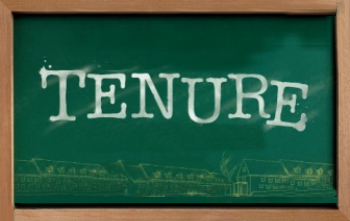Explore resources to help document your community-engaged scholarship and create strong portfolios for promotion and tenure.
- Contact us at [email protected] or if you have any questions about these resources.
- Use our Support Request Form to request a consultation or support in implementing these resources.
- Join our Academic Partner mailing list to stay informed about upcoming events and opportunities!
Provost's Recommendation
In this memorandum U-M's Provost's Office encourages those evaluating tenure and promotion documents to recognize and consider community engagement, specifically naming service-learningc, ommunity-based research, and advising students in public service activities.
Framing Community Engagement for Tenure & Promotion
At this virtual session co-sponsored by the Ginsberg Center & NCID, Katie Richards-Schuster, associate professor in the School of Social Work and director of undergraduate minor programs, and Anya Sirota, associate professor of architecture and associate dean for academic initiatives, shared their insights and experiences with packaging and framing their community engagement work in tenure and promotion materials.
Materials from the event: Video recording, Presentation Slides (with Linked Resources) and Transcription Notes
Alliance for the Arts in Research Universities Resources
Insights and resources for academic leadership, institutional officers, and faculty on tenure and promotion with a specific focus on the the arts, interdisciplinarity, and community engagement. The Alliance for the Arts in Research Universities (A2RU) undertakes original research about tenure and promotion policies and practices to help foster inclusivity in arts research.
CES4Health
Online database of peer-reviewed products of community-engaged scholarship that are in forms other than journal articles. CES4Health widely disseminates high-quality products that can improve the health of communities and "count" in the faculty promotion and tenure process.
Community-Engaged Scholarship Toolkit
Assists faculty and graduate students to carefully document their community-engaged scholarship and produce strong portfolios for promotion and tenure. Includes a sample dossier that shows how a community-engaged scholar may present his or her work to review, promotion and tenure (RPT) committees. A group exercise simulating an RPT committee process can be used as an educational tool with RPT committees.
A few related articles
- Changfoot, N., Andrée, P., Levkoe, C. Z., Nilson, M. and Goemans, M. (2020). Engaged Scholarship in Tenure and Promotion: Autoethnographic Insights from the Fault Lines of a Shifting Landscape. Michigan Journal of Community Service Learning, 26(1), 239–264.
-
Doberneck, D. Glass, C.R. & Schweitzer, J. 2010. From Rhetoric to Reality: A Typology of Publically Engaged Scholarship. Journal of Higher Education Outreach and Engagement, 14, 4.
-
Ellison, J., & Eatman, T. K. (2008). Scholarship in Public: Knowledge Creation and Tenure Policy in the Engaged University. Syracuse, NY: Imagining America.
-
Franz, N. K. (2011). Tips for Constructing a Promotion and Tenure Dossier that Documents Engaged Scholarship Endeavors. Journal of Higher Education Outreach and Engagement, 15(3), 15–30.
-
Gale, S., Herrera, P., Linask, M., Maurantonio, N. Miller, D. and Pelco, L. E. (2023). Suggestions for early career community-engaged scholars: developing your identity statement, finding your mentors, and documenting your scholarship. Bonner Center for Civic Engagement, University of Richmond, Richmond, VA.
-
Miller, D. and Pelco, L. E. (2023) Community-engaged faculty activity: A resource guide for department chairs. Bonner Center for Civic Engagement, University of Richmond,Richmond, VA.
-
Pelco, L.E., Miller, D., & Lookingbill, T. (2022). Valuing community engagement throughout the faculty recruitment process. Bonner Center for Civic Engagement, University of Richmond, Richmond, VA.

